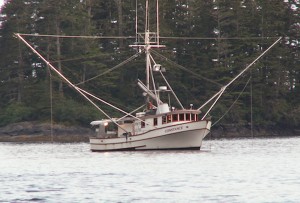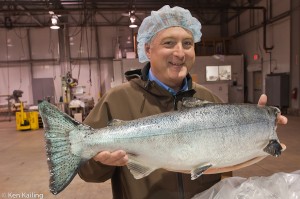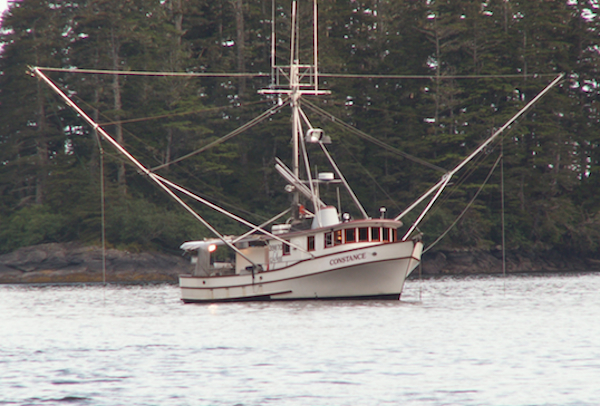John Ryan, reporter for KUOW – one of Seattle’s public radio stations, today focused on the distribution channels for fresh-and-airlifted and frozen-at-sea fish from Alaska. In his report today – Frozen Fish Help Cool the Climate – he notes:
The fishing industry is not one of the world’s major energy users or sources of greenhouse gas emissions. But the industry has a big incentive to fight the buildup of carbon dioxide in the atmosphere. That CO2 is both heating the oceans and making them more acidic. Both trends are bad news for much of the ocean food chain.
The need for speed with perishable foods makes air cargo the only practical way to get fresh fish to customers an ocean away. But once the seafood is frozen, there’s no rush, and it can take a slow boat trip to market. Mile for mile, ton for ton, air cargo puts out at least 20 times more carbon dioxide than shipping at sea does.

At GoodFood World, we have been following the trail of troll-caught, frozen-at-sea Alaska salmon from boat to table, beginning with a profile of the Fishing Vessel Constance and its captain, Krist Martinsen, in Catching the Perfect Fish. The F/V Constance (named after Krist’s grandmother), is based in Sitka Alaska. For almost 35 years, Krist has been a troll fisherman. He fishes with a hook and line, using natural and artificial baits, and brings in each fish by hand. From May until September, from 4:00 AM to 11:00 PM, Krist and his sons are on deck catching salmon, halibut, and lingcod.
Even perfect fish don’t easily get from boat to table. While fishermen like Martinsen take special care to treat the fish they catch respectfully and prepare them carefully for delivery to retailers and restaurateurs there are more stops along the supply chain.

Mark Tupper, Triad Fisheries, represents 17 boats that fish full time for him and he sells premium-priced specialty fish – sashimi-grade salmon – under the Bruce Gore Frozen-at-Sea brand. “I pay the fishermen as I sell the fish. Business is done with honor and with a handshake. We also honor the fish; we pay homage to the product rather than massively killing fish every day,” said Mark, in Doing Business with a Handshake to Market Perfect Fish.
All the seafood Triad handles is shipped from Alaska via barges rather than air-freighted. Even with the slower transportation method, the fish could be considered fresher than the fresh (not previously frozen) fish sold in markets today.
Watch for the next step in the value chain: selling premium salmon across the retail counter. Scheduled is a visit to Town and Country Markets and a discussion with Chris King, Seafood Specialist, buyer for the small chain of six supermarkets.

